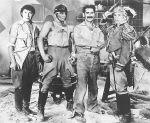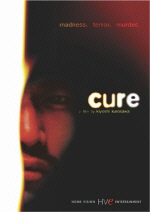
Cure (Japanese - 2001)
In the hands of director Kiyoshi Kurosawa, a serial-killer movie is not merely a serial-killer movie. Cure doesn't so much scream and shout as drive the audience slowly crazy--much like Kurosawa's subsequent creepfests, Seance and Pulse (a.k.a. Kairo). Koji Yakusho, the happy-foot husband in Shall We Dance, plays a weary detective on a baffling murder case, which paradoxically becomes even more puzzling as the solution begins to emerge. Kurosawa's use of empty spaces, and his uncanny command of the soundtrack (the eerie collection of hums and drones would win David Lynch's approval) makes for a shivery experience... though not one interested in resolving itself in a conventional manner. And why should it? At some terrible point in this movie you realize that catching the bad guy isn't going to make Kurosawa's poisoned world any cleaner or safer. Stick with the director's elliptical style, and Cure will leave dread in its tainted wake.
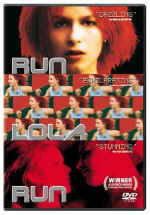
It's difficult to create a film that's fast paced, exciting, and aesthetically appealing without diluting its dialogue. Run Lola Run, directed and written by Tom Tykwer, is an enchanting balance of pace and narrative, creating a universal parable that leaps over cultural barriers. This is the story of young Lola (Franka Potente) and her boyfriend Manni (Moritz Bleibtreu). In the space of 20 minutes, they must come up with 100,000 deutsche marks to pay back a seedy gangster, who will be less than forgiving when he finds out that Manni incompetently lost his cash to an opportunistic vagrant. Lola, confronted with one obstacle after another, rides an emotional roller coaster in her high-speed efforts to help the hapless Manni--attempting to extract the cash first from her double-dealing father (appropriately a bank manager), and then by any means necessary. From this point nothing goes right for either protagonist, but just when you think you've figured out the movie, the director introduces a series of brilliant existential twists that boggle the mind. Tykwer uses rapid camera movements and innovative pauses to explore the theme of cause and effect. Accompanied by a pulse-pounding soundtrack, we follow Lola through every turn and every heartbreak as she and Manni rush forward on a collision course with fate. There were a variety of original and intelligent films released in 1999, but perhaps none were as witty and clever as this little gem--one of the best foreign films of the year.
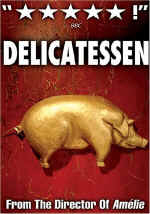
The title credit for Delicatessen reads "Presented by Terry Gilliam," and it's easy to understand why the director of Brazil was so supportive of this outrageously black French comedy from 1991. Like Gilliam, French codirectors Jean-Pierre Jeunet and Marc Caro have wildly inventive imaginations that gravitate to the darker absurdities of human behavior, and their visual extravagance is matched by impressive technical skill. Here, making their feature debut, Jeunet and Caro present a postapocalyptic scenario set entirely in a dank and gloomy building where the landlord operates a delicatessen on the ground floor. But this is an altogether meatless world, so the butcher-landlord keeps his customers happy by chopping unsuspecting victims into cutlets, and he's sharpening his knife for a new tenant (French comic actor Dominque Pinon) who's got the hots for the butcher's nearsighted daughter! Delicatessen is a feast (if you will) of hilarious vignettes, slapstick gags, and sweetly eccentric characters, including a man in a swampy room full of frogs, a woman doggedly determined to commit suicide (she never gets its right), and a pair of brothers who make toy sound boxes that "moo" like cows. It doesn't amount to much as a story, but that hardly matters; this is the kind of comedy that springs from a unique wellspring of imagination and inspiration, and it's handled with such visual virtuosity that you can't help but be mesmerized. There's some priceless comedy happening here, some of which is so inventive that you may feel the urge to stand up and cheer.
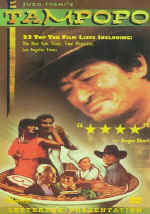
Like seeds of a dandelion blowing in the wind, the plot of Tampopo wanders in several directions, following the lives of a quirky collection of characters. At the heart of this film is a young widow named Tampopo (Nobuko Miyamoto), who is struggling to make ends meet by running a noodle restaurant. Goro (Tsutomu Yamazaki), a truck driver, saves Tampopo's young son from being beaten by a group of school girls and is rewarded with a bowl of very bad ramen (noodles). Goro tells Tampopo the awful truth about her cooking and she asks for his help. Together they search for the perfect ramen recipe.
Intersecting this part of the plot are several smaller and less well-realized stories. Koji Yakusho, who stars in Shall We Dance, appears as a sensuous gangster who would rather play with his food than eat it. Then there's the mysterious Noodle Master who lives with a group of street vagabonds and a young executive who knows how to order food from a French menu, but not how to preserve the dignity of his superiors.
While the film as a whole feels somewhat disjointed, writer-director Juzo Itami manages to infuse Tampopo (which means "dandelion") with a sense of Japanese joie de vivre that is worth experiencing. Take notes during the "soup scenes" and see what you can cook up for yourself.
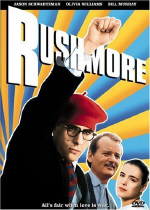
Wes Anderson's follow-up to the quirky Bottle Rocket is a wonderfully unorthodox coming-of-age story that ranks with Harold and Maude and The Graduate in the pantheon of timeless cult classics. Jason Schwartzman (son of Talia Shire and nephew of Francis Coppola) stars as Max Fischer, a 15-year-old attending the prestigious Rushmore Academy on scholarship, where he's failing all of his classes but is the superstar of the school's extracurricular activities (head of the drama club, the beekeeper club, the fencing club...). Possessing boundless confidence and chutzpah, as well as an aura of authority he seems to have been born with, Max finds two unlikely soulmates in his permutations at Rushmore: industrial magnate and Rushmore alumnus Herman Blume (Bill Murray) and first-grade teacher Rosemary Cross (Olivia Williams). His alliance with Blume and crush on Miss Cross, however, are thrown out of kilter by his expulsion from Rushmore, and a budding romance between the two adults that threatens Max's own designs on the lovely schoolteacher.
Never stooping to sentimentality or schmaltz, Anderson and cowriter Owen Wilson have fashioned a wickedly intelligent and wildly funny tale of young adulthood that hits all the right notes in its mix of melancholy and optimism. As played by Schwartzman, Max is both immediately endearing and ferociously irritating: smarter than all the adults around him, with little sense of his shortcomings, he's an unstoppable dynamo who commands grudging respect despite his outlandish projects (including a school play about Vietnam). Murray, as the tycoon who determinedly wages war with Max for the affections of Miss Cross, is a revelation of middle-aged resignation. Disgusted with his family, his life, and himself, he's turned around by both Max's antagonism and Miss Cross's love. Williams is equally affecting as the teacher who still carries a torch for her dead husband, and the superb supporting cast also includes Seymour Cassel as Max's barber father, Brian Cox as the frustrated headmaster of Rushmore, and a hilarious Mason Gamble as Max's young charge. Put this one on your shelf of modern masterpieces.
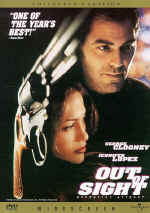
Out of Sight was one of the best movies of 1998, but ironically this superior crime comedy was a box-office disappointment. Fortunately the movie can enjoy a long life on home video, where it can be savored by anyone who missed its original release. Making his best film since 1989's sex, lies, and videotape, director Steven Soderbergh pays tribute to the signature wit and intricacy of Elmore Leonard's novel, brilliantly adapted by Scott Frank, the gifted screenwriter who previously adapted Leonard's Get Shorty. The movie's a prime showcase for the talent and chemistry of George Clooney and Jennifer Lopez, respectively playing a career bank robber who's escaped from jail and the federal agent who falls for his charms while tracking him down. Soderbergh directs with confident visual flair, shifting time- lines (à la Pulp Fiction) to weave together subplots and maintain vivid focus on Leonard's splendid characters and smooth-as-silk dialogue. While the sexy repartée between Clooney and Lopez recalls the vintage interplay of Humphrey Bogart and Lauren Bacall, Ving Rhames and Steve Zahn add ample comic relief as Clooney's accomplices. Dennis Farina is memorable as Lopez's father, and Albert Brooks is almost unrecognizable as a Wall Street crook whose mansion--and a cache of uncut diamonds--provides the setting for the film's climactic caper. As orchestrated by Soderbergh, the film offers a feast of plot twists and surprises, but it never loses track of its delightful characters and the clever wit that brings them so vividly to life. The Collector's Edition DVD includes commentary by Soderbergh, deleted scenes, production notes, theatrical trailers, and more.
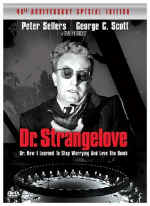
Arguably the greatest black comedy ever made, Stanley Kubrick's cold-war classic is the ultimate satire of the nuclear age. Dr. Strangelove is a perfect spoof of political and military insanity, beginning when General Jack D. Ripper (Sterling Hayden), a maniacal warrior obsessed with "the purity of precious bodily fluids," mounts his singular campaign against Communism by ordering a squadron of B-52 bombers to attack the Soviet Union. The Soviets counter the threat with a so- called "Doomsday Device," and the world hangs in the balance while the U.S. president (Peter Sellers) engages in hilarious hot-line negotiations with his Soviet counterpart. Sellers also plays a British military attaché and the mad bomb-maker Dr. Strangelove; George C. Scott is outrageously frantic as General Buck Turgidson, whose presidential advice consists mainly of panic and statistics about "acceptable losses." With dialogue ("You can't fight here! This is the war room!") and images (Slim Pickens's character riding the bomb to oblivion) that have become a part of our cultural vocabulary, Kubrick's film regularly appears on critics' lists of the all-time best.
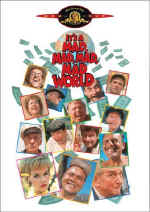
Stanley Kramer's sprawling 1963 comedy about a search for buried treasure by at least a dozen people--all played by well-known entertainers of their day--is the kind of mass comedy that Hollywood hasn't made in many years. (Another example from around the same time is Blake Edwards's The Great Race.) After a number of strangers (including Milton Berle, Jonathan Winters, Sid Caesar, Phil Silvers, and others) witness a dying stranger (Jimmy Durante) identify the location of hidden money, a conflict-ridden hunt begins, watched over carefully by a suspicious cop (Spencer Tracy). The ensuing two and a half hours of mayhem has its ups and downs--some bits and performers are certainly funnier than others. But Kramer, who is better known for socially conscious, serious cinema (Guess Who's Coming to Dinner?), is in a mood for broad comic characterization, and some of his jokes are so intentionally obvious (Durante literally kicks a bucket when he dies), they'd have a place in Airplane! Watch for lots of cameo appearances, including Jerry Lewis (who had called Kramer and asked him why he hadn't been invited to participate).

If you were to argue that Mel Brooks's Young Frankenstein ranks among the top-ten funniest movies of all time, nobody could reasonably dispute the claim. Spoofing classic horror in the way that Brooks's previous film Blazing Saddles sent up classic Westerns, the movie is both a loving tribute and a raucous, irreverent parody of Universal's classic horror films Frankenstein (1931) and Bride of Frankenstein (1935). Filming in glorious black and white, Brooks re-created the Frankenstein laboratory using the same equipment from the original Frankenstein (courtesy of designer Kenneth Strickfaden), and this loving attention to physical and stylistic detail creates a solid foundation for nonstop comedy. The story, of course, involves Frederick Frankenstein (Gene Wilder) and his effort to resume experiments in re-animation pioneered by his late father. (He's got some help, since dad left behind a book titled How I Did It.) Assisting him is the hapless hunchback Igor (Marty Feldman) and the buxom but none-too-bright maiden Inga (Teri Garr), and when Frankenstein succeeds in creating his monster (Peter Boyle), the stage is set for an outrageous revision of the Frankenstein legend. With comedy highlights too numerous to mention, Brooks guides his brilliant cast (also including Cloris Leachman, Madeline Kahn, Kenneth Mars, and Gene Hackman in a classic cameo role) through scene after scene of inspired hilarity. Indeed, Young Frankenstein is a charmed film, nothing less than a comedy classic, representing the finest work from everyone involved. Not one joke has lost its payoff, and none of the countless gags have lost their zany appeal. From a career that includes some of the best comedies ever made, this is the film for which Mel Brooks will be most fondly remembered. Befitting a classic, the Special Edition DVD includes audio commentary by Mel Brooks, a "making of" documentary, interviews with the cast, hilarious bloopers and outtakes, and the original theatrical trailers. No video library should be without a copy of Young Frankenstein. And just remember--that's Fronkensteen.
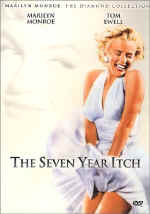
A married man, left alone during a hot summer, fantasizes madly about the impossibly gorgeous woman living in the upstairs apartment. When the woman is Marilyn Monroe, such fantasies are the stuff of epics, and The Seven Year Itch is a memorable laugh machine. Tom Ewell, repeating his role from George Axelrod's Broadway hit, plays the itchy protagonist, whose vivid imagination gets the better of him. When Monroe finally comes downstairs and becomes friends (confiding, among other things, that she keeps her undies in the icebox in this hot weather), imagination meets reality in a merciless attack on the male libido. Ewell's crack timing is matched by Monroe's zesty comic flair, and the scene in which her white dress is blown skyward by a passing subway train has entered the encyclopedia of great movie images. Director Billy Wilder adapted the play with Axelrod; if the film is not one of Wilder's signature works (Some Like It Hot and The Apartment would soon follow), it is nevertheless a smoothly crafted comedy.
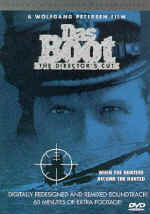
This is the restored, 209-minute director's cut of Wolfgang Petersen's harrowing and claustrophobic U-boat thriller, which was theatrically re-released in 1997. Originally made as a six-hour miniseries, this version devotes more time to getting to know the crew before they and their stoic captain (Jürgen Prochnow) get aboard their U-boat and find themselves stranded at the bottom of the sea. Das Boot puts you inside that submerged vessel and explores the physical and emotional tensions of the situation with a vivid, terrifying realism that few movies can match. As Petersen tightens the screws and the submerged ship blows bolts, the pressure builds to such unbearable levels that you may be tempted to escape for a nice walk on solid land in the great outdoors--only you wouldn't dream of looking away from the screen. The digital video disc offers either the German-language version with English subtitles, or the dubbed-into English version; the Dolby Digital 5.1 soundtrack reproduces every chilling depth charge and metallic groan with nerve-racking clarity. Also included is a short feature on the movie's production, but the segment gives away a lot, so watch the movie first.
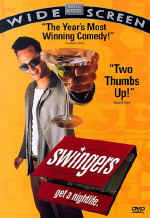
For anyone who wants to catch a glimpse of the Los Angeles "lounge" scene that was in vogue during the early and mid-1990s, here's the movie that virtually defined that brief but colorful nightlife milieu. As an added bonus, it just happens to be a very funny, observant story about love, loss, and male bonding among a group of friends who struggle to find decent jobs by day, and lurk through Hollywood's hottest nightclubs by night. A sort of latter-day Rat Pack, they include Mike (writer-actor Jon Favreau) and his closest buddy, Trent (Vince Vaughn), who are waiting for the big show-biz break that seems to be eluding them. Mike's twisted up about the girlfriend he left back East to pursue his going-nowhere standup comedy career, and Trent uses the word "money" as an adjective ("Man, we look totally money tonight") with such frequency that you may find yourself slipping into lounge-lizard mode after watching the movie. One of the most noteworthy indie-film success stories of the '90s, this time-capsule comedy seized its moment in the spotlight, launched several promising careers, and continues to maintain its lasting appeal.
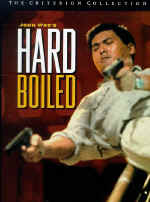
Masterful Hong Kong action director John Woo (The Killer, Face/Off) turns in this exciting and pyrotechnic tale of warring gangsters and shifting loyalties. Chow Yun-fat (The Replacement Killers) plays a take-no-prisoners cop on the trail of the triad, the Hong Kong Mafia, when his partner is killed during a gun battle. His guilt propels him into an all-out war against the gang, including an up-and-coming soldier in the mob (Tony Leung) who turns out to be an undercover cop. The two men must come to terms with their allegiance to the force and their loyalty to each other as they try to take down the gangsters. A stunning feast of hyperbolic action sequences (including a climactic sequence in an entire hospital taken hostage), Hard-Boiled is a rare treat for fans of the action genre, with sequences as thrilling and intense as any ever committed to film.
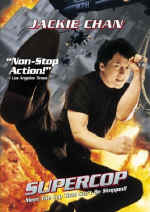
High-octane gas, pumped out by the buoyant maestro of Hong Kong action, Jackie Chan. In this outing, the irrepressible Chan plays a Hong Kong cop teamed up (gloriously) with a Chinese inspector played by Michelle Yeoh (a.k.a. Michelle Khan). The plot ranges all over Southeast Asia, culminating with Jackie hanging from a helicopter ladder high over the streets of Kuala Lumpur. This one's notable for the ingenuity of the stunts, and for allowing two of Asia's top female stars to do their bad thing. The great Maggie Cheung (Chinese Box) plays Chan's girlfriend, who has a tendency to pop up at the most inopportune moments; and Yeoh executes a hair-raising motorcycle jump onto a moving train--an absolute jaw-dropper. Originally released as Police Story III, the picture was rereleased in America as Supercop in 1996, after Chan's U.S. breakthrough with Rumble in the Bronx. The new version is slightly shorter than the original, and features a new soundtrack of English-language dialogue (awkwardly dubbed, but that's par for the course) and blaring rock music. Great fun any way you slice it, and--for the uninitiated--a terrific introduction to the humorous, high-kicking world of Jackie Chan.
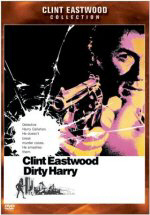
Whether or not you can sympathize with its fascistic/vigilante approach to law enforcement, Dirty Harry (directed by star Clint Eastwood's longtime friend and directorial mentor, Don Siegel) is one hell of a cop thriller. The movie makes evocative use of its San Francisco locations as cop Harry Callahan (Eastwood) tracks the elusive "Scorpio killer" who has been terrorizing the city by the Bay. As the psychopath's trail grows hotter, Harry becomes increasingly impatient and intolerant of the frustrating obstacles (departmental red tape, individuals' civil rights) that he feels are keeping him from doing his job. A characteristically taut and tense piece of filmmaking from Siegel (Invasion of the Body Snatchers, The Shootist, Escape from Alcatraz), it also remains a fascinating slice of American pop culture. It was a big hit (followed by four sequels) that obviously reflected--or exploited--the almost obsessive or paranoid fears and frustrations many Americans felt about crime in the streets. At a time when "law and order" was a familiar slogan for political candidates, Harry Callahan may have represented neither, but from his point of view his job was simple: stop criminals. To him that end justified any means he deemed necessary.

When Stanley Kubrick recruited Arthur C. Clarke to collaborate on "the proverbial intelligent science fiction film," it's a safe bet neither the maverick auteur nor the great science fiction writer knew they would virtually redefine the parameters of the cinema experience. A daring experiment in unconventional narrative inspired by Clarke's short story "The Sentinel," 2001 is a visual tone poem (barely 40 minutes of dialogue in a 139-minute film) that charts a phenomenal history of human evolution. From the dawn-of-man discovery of crude but deadly tools in the film's opening sequence to the journey of the spaceship Discovery and metaphysical birth of the "star child" at film's end, Kubrick's vision is meticulous and precise. In keeping with the director's underlying theme of dehumanization by technology, the notorious, seemingly omniscient computer HAL 9000 has more warmth and personality than the human astronauts it supposedly is serving. (The director also leaves the meaning of the black, rectangular alien monoliths open for discussion.) This theme, in part, is what makes 2001 a film like no other, though dated now that its postmillennial space exploration has proven optimistic compared to reality. Still, the film is timelessly provocative in its pioneering exploration of inner- and outer-space consciousness. With spectacular, painstakingly authentic special effects that have stood the test of time, Kubrick's film is nothing less than a cinematic milestone--puzzling, provocative, and perfect.
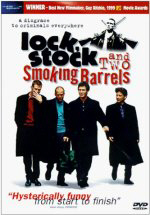
Cockney boys Tom, Soap, Eddie, and Bacon are in a bind; they owe seedy criminal and porn king "Hatchet" Harry a sizable amount of cash after Eddie loses half a million in a rigged game of poker. Hot on their tails is a thug named Big Chris who intends to send them all to the hospital if they don't come up with the cash in the allotted time. Add into the mix an incompetent set of ganja cultivators, two dimwitted robbers, a "madman" with an afro, and a ruthless band of drug dealers and you have an astonishing movie called Lock, Stock and Two Smoking Barrels. Before the boys can blink, they are caught up in a labyrinth of double-crosses that lead to a multitude of dead bodies, copious amounts of drugs, and two antique rifles.
Written and directed by talented newcomer Guy Ritchie, this is one of those movies that was destined to become an instant cult classic à la Reservoir Dogs. Although some comparisons were drawn between Ritchie and Quentin Tarantino, it would be unfair to discount the brilliant wit of the story and the innovative camerawork that the director brings to his debut feature. Not since The Krays has there been such an accurate depiction of the East End and its more colorful characters. Indicative of the social stratosphere in London, Ritchie's movie is a hilarious and at times touching account of friendships and loyalty. The director and his mates (who make up most of the cast) clearly are enjoying themselves here. This comes across in some shining performances, in particular from ex-footballer Vinnie Jones (Big Chris) and an over-the-top Vas Blackwood (as Rory Breaker), who very nearly steals the show. Full of quirky vernacular and clever tension-packed action sequences, Lock, Stock and Two Smoking Barrels is a triumph--a perfect blend of intelligence, humor, and suspense.
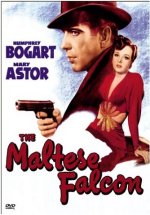
Still the tightest, sharpest, and most cynical of Hollywood's official deathless classics, bracingly tough even by post-Tarantino standards. Humphrey Bogart is Dashiell Hammett's definitive private eye, Sam Spade, struggling to keep his hard-boiled cool as the double-crosses pile up around his ankles. The plot, which dances all around the stolen Middle Eastern statuette of the title, is too baroque to try to follow, and it doesn't make a bit of difference. The dialogue, much of it lifted straight from Hammett, is delivered with whip-crack speed and sneering ferocity, as Bogie faces off against Peter Lorre and Sidney Greenstreet, fends off the duplicitous advances of Mary Astor, and roughs up a cringing "gunsel" played by Elisha Cook Jr. It's an action movie of sorts, at least by implication: the characters always seem keyed up, right on the verge of erupting into violence. This is a turning-point picture in several respects: John Huston (The African Queen) made his directorial debut here in 1941, and Bogart, who had mostly played bad guys, was a last-minute substitution for George Raft, who must have been kicking himself for years afterward. This is the role that made Bogart a star and established his trend-setting (and still influential) antihero persona.
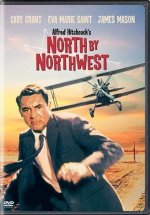
A strong candidate for the most sheerly entertaining and enjoyable movie ever made by a Hollywood studio (with Citizen Kane, Only Angels Have Wings and Trouble in Paradise running neck and neck). Positioned between the much heavier and more profoundly disturbing Vertigo (1958) and the stark horror of Psycho (1960), North by Northwest (1959) is Alfred Hitchcock at his most effervescent in a romantic comedy-thriller that also features one of the definitive Cary Grant performances. Which is not to say that this is just "Hitchcock Lite"; seminal Hitchcock critic Robin Wood (in his book Hitchcock's Films Revisited) makes an airtight case for this glossy MGM production as one of The Master's "unbroken series of masterpieces from Vertigo to Marnie." It's a classic Hitchcock Wrong Man scenario: Grant is Roger O. Thornhill (initials ROT), an advertising executive who is mistaken by enemy spies for a U.S. undercover agent named George Kaplan. Convinced these sinister fellows (James Mason as the boss, and Martin Landau as his henchman) are trying to kill him, Roger flees and meets a sexy Stranger on a Train (Eva Marie Saint), with whom he engages in one of the longest, most convolutedly choreographed kisses in screen history. And, of course, there are the famous set pieces: the stabbing at the United Nations, the crop-duster plane attack in the cornfield (where a pedestrian has no place to hide), and the cliffhanger finale atop the stone faces of Mount Rushmore. Plus a sparkling Ernest Lehman script and that pulse-quickening Bernard Herrmann score. What more could a moviegoer possibly desire?
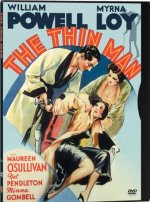
The intoxicating chemistry and repartee between the oft-teamed William Powell and Myrna Loy as Nick and Nora Charles--America's favorite soused detectives--is fully 100-proof in the marvelously witty Thin Man movies. You simply won't find more delightful movie company than Nick and Nora. The title, of course, refers not to Nicky the dick, but to the mysteriously missing scientist he and his lovely partner set out to find. Powell and Loy deliver their sparkling dialog with giddy enthusiasm (and occasionally slurred speech) in this rapid-fire, three-martini suspense comedy directed by famously speedy W.S. Van Dyke and adapted from the novel by Dashiell Hammett. The success of The Thin Man spawned a litter of sequels, including After the Thin Man (featuring a young James Stewart), Another Thin Man (in which a baby is added to the Charles family), Shadow of the Thin Man, The Thin Man Goes Home, and Song of the Thin Man.
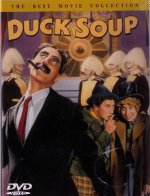
For those who love the Marx Brothers (Animal Crackers, A Night at the Opera), that this movie is side-slappingly funny is a given. For those new to the Marx Brothers, this is the perfect introduction to Groucho, Chico, and Harpo (and even Zeppo), three of the funniest men to ever grace the screen. Rufus T. Firefly (Groucho) is the dictator of the small nation Freedonia. The country is a disaster, in financial disrepair, and the wealthy Mrs. Teasdale (Margaret Dumont) is its benefactor and the object of Firefly's shrewd affection. When the leader of the neighboring Sylvania decides he's in love with Mrs. Teasdale, Firefly declares war. The movie, from 1933, is tremendously satirical, a play on politics and war. (As Firefly says to a hapless young solider, "You're a brave man. Go and break through the lines. And remember, while you're out there risking your life and limb through shot and shell, we'll be in be in here thinking what a sucker you are.") Full of witty lines, great sight gags, and even some snazzy song numbers ("Freedonia's Going to War" is the hilarious declaration of battle), this is surely one of the best--if not the best--the Marx Brothers have to offer.

Alien (USA - 1978)
A landmark of science fiction and horror, Alien arrived in 1979 between Star Wars and The Empire Strikes Back as a stylishly malevolent alternative to George Lucas's space fantasy. Partially inspired by 1958's It! The Terror from Beyond Space, this instant classic set a tone of its own, offering richly detailed sets, ominous atmosphere, relentless suspense, and a flawless ensemble cast as the crew of the space freighter Nostromo, who fall prey to a vicious creature (designed by Swiss artist H.R. Giger) that had gestated inside one of the ill-fated crew members. In a star-making role, Sigourney Weaver excels as sole survivor Ripley, becoming the screen's most popular heroine in a lucrative movie franchise. To measure the film's success, one need only recall the many images that have been burned into our collective psyche, including the "facehugger," the "chestburster," and Ripley's climactic encounter with the full-grown monster. Impeccably directed by Ridley Scott, Alien is one of the cinema's most unforgettable nightmares.
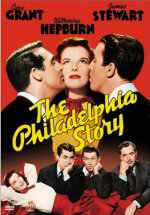
Recreating the role she originated in Philip Barry's wickedly witty Broadway play, Katharine Hepburn stars as the spoiled and snobby socialite Tracy Lord in this sparkling 1940 screen adaptation of The Philadelphia Story, one of the great romantic comedies from the golden age of MGM studios. Applying her impossibly high ideals to everyone but herself, Tracy is about to marry a stuffy executive when her congenial ex-husband (Cary Grant), arrives to protect his former father-in-law from a potentially scandalous tabloid exposé. In an Oscar-winning role, James Stewart is the scandal reporter who falls for Tracy as her wedding day arrives, throwing her into a dizzying state of premarital jitters. Who will join Tracy at the altar? Snappy dialogue flows like sparkling wine under the sophisticated direction of George Cukor in this film that turned the tide of Hepburn's career from "box-office poison" to glamorous Hollywood star.
